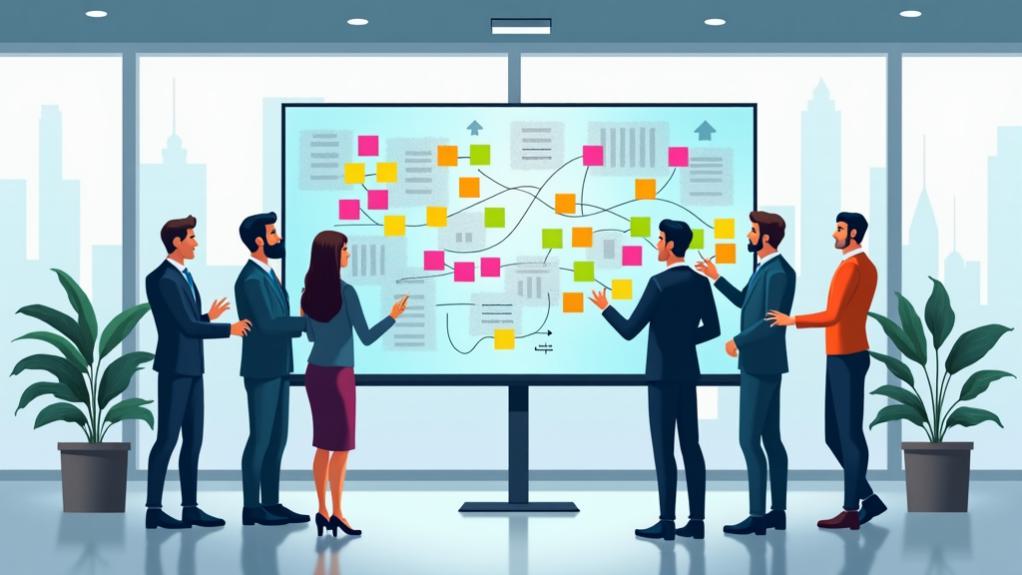Mastering Strategic Planning Facilitation Techniques

You're on the path to mastering strategic planning facilitation techniques, a skillset that equips you to traverse complex group interactions and drive business success through clear, actionable plans. As you refine your facilitation skills, you'll learn to manage logistics, enable full participation, and provide neutral structure to improve decision-making. Effective facilitation aligns long-term priorities with short-term goals, leading to business success. By exploring the fundamentals of strategic facilitation, preparing for sessions, and employing expert techniques, you'll reveal the secrets to achieving meeting outcomes, documenting action items, and continuously improving your skills - and that's just the beginning.
Strategic Facilitation Fundamentals
As you investigate strategic planning, it's essential to grasp the fundamentals of strategic facilitation. You need to understand how facilitation enables effective group collaboration and cooperation, driving strategic alignment and desired outcomes.
Expert facilitators play key facilitation roles, managing logistics and enabling CEOs to participate fully in discussions. They act as content-neutral parties, providing structure to enhance decision-making and supporting full participation.
By mastering facilitation fundamentals, you can access the full potential of your strategic planning sessions. You'll learn to align long-term strategic priorities with short-term goals, manage group interactions, and drive high ROI through professional facilitation.
Effective facilitation requires energy, focus, and patience, but the payoff is significant – a clear, actionable plan that drives business success.
Effective Session Preparation
You've grasped the fundamentals of strategic facilitation; now it's time to prepare for a successful session. Effective session preparation is essential to achieving your desired outcomes. You need to define clear session objectives, identify participant roles, and assign relevant pre-work to make certain everyone is on the same page.
| Session Preparation Tasks | Responsibilities |
|---|---|
| Define session objectives and agenda | Facilitator and Meeting Coordinator |
| Assign participant roles and pre-work | Facilitator and Meeting Coordinator |
| Confirm attendance and logistical details | Meeting Coordinator |
Expert Facilitation Techniques
Effective facilitation is the linchpin of successful strategic planning sessions. As a facilitator, you'll want to excel in various facilitation styles to adapt to different group interactions and objectives.
Your goal is to create an environment where participants feel engaged, motivated, and enabled to contribute. To achieve this, you'll need to employ effective engagement strategies, such as active listening, open-ended questions, and purposeful icebreakers.
By doing so, you'll cultivate a collaborative atmosphere that encourages creative problem-solving and strategic thinking. Your facilitation techniques will either make or break the session's success, so it's essential to be intentional and flexible in your approach.
Encouraging Group Participation
Someone who's led a strategic planning session knows that encouraging group participation is a delicate art. You need to strike a balance between letting everyone contribute and keeping the discussion on track.
To achieve this, you'll want to employ a range of brainstorming methods, such as Round Robin, Freewheeling, and Group Pass. These techniques will help you encourage full and equal participation from all team members.
You'll also want to establish clear expectations and ground rules for participation and interaction. Consider using participation strategies like setting aside time for quieter individuals to share their input or using purposeful icebreakers to energize the team.
Achieving Meeting Outcomes
Now that you've encouraged group participation and generated a wealth of ideas, it's time to focus on achieving concrete meeting outcomes. To guarantee outcome measurement and decision alignment, you'll need to guide the group in evaluating and prioritizing their ideas. Use the following structure to assess and refine their proposals:
| Evaluation Criteria | Description |
|---|---|
| Alignment | Does the proposal align with the organization's strategic objectives? |
| Feasibility | Is the proposal realistic and achievable with available resources? |
| Impact | Will the proposal have a significant impact on the organization? |
| Risk | What are the potential risks associated with the proposal? |
| Cost | What are the estimated costs of implementing the proposal? |
Documenting Action Items
Clarity is key when it comes to documenting action items - a critical step that can make or break the success of your strategic planning session.
You must assure that all action items are clearly defined, assigned to a specific individual, and include a deadline for completion. Use the Who-What-When structure to document action items, specifying who's responsible, what needs to be done, and when it's due.
This structure helps prevent confusion and overlapping work. Implement action tracking and accountability measures to monitor progress and guarantee successful implementation.
Assign one accountable person for each action item to assure clarity and prevent stagnation. By doing so, you'll be able to track progress and confirm completed actions at the start of future meetings.
Continuous Improvement Strategies
As you strive to refine your strategic planning process, embedding a culture of continuous improvement is vital for long-term success.
You'll want to establish feedback loops that allow you to assess the effectiveness of your sessions and identify areas for enhancement. Regular session evaluations will help you gather perspectives from participants, highlighting what works and what doesn't.
By acting on this feedback, you'll hone your facilitation skills and create a more effective strategic planning process. It's essential to accept all feedback as opportunities for growth and incorporate suggestions into future sessions.
This repetitive approach will enable you to stay agile and adapt to changing business needs, ultimately driving better outcomes and sustaining long-term success.
In Summary
You've now got the skills to command strategic planning facilitation techniques. By applying these fundamentals, you'll enhance collaboration, drive business strategy, and deliver a high return on investment. You'll create clear agendas, manage logistics, prioritize key topics, and document action items. As you continuously improve, you'll drive outcomes and track progress. Your team will thrive under your expert facilitation, and you'll be equipped to tackle complex business challenges head-on. Your strategic planning sessions will never be the same.
Get a Free Demo and 30 Day Trial
See why Action Strategy Software is a top choice for small to medium sized organizations

Who is Charles Dayton, and Why Should You Listen to Him?
Introducing Charles Dayton
Meet Charles Dayton, CEO and Founder of Action Strategy, with two decades of experience in consulting with City Governments, Tribal Governments and corporations. He possesses the keen insight and expertise necessary to unlock your organization's potential. With his cutting-edge software, he empowers you to power through complexities and roadblocks, to deliver enviable growth.
Besides consulting, Charles is a family man, community leader and renowned artist.
